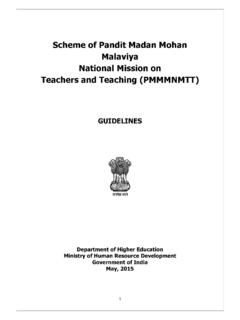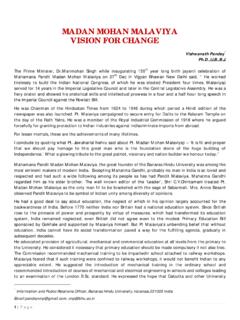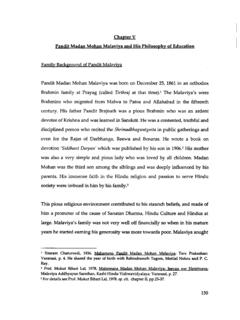Transcription of SOCIAL BACKGROUND OF INDIAN NATIONALISM - Weebly
1 SOCIAL BACKGROUND OF INDIAN NATIONALISM ii BY THE SAME AUTHOR INDIAN Feudal States and National Liberation Struggle Gandhi's Truth&Non-violence X' Rayed Recent Trends in INDIAN NATIONALISM Rural India in Transition Rural Sociology in India Essays on Modernisation of Underdeveloped Societies (2 vols.) (Ed.) Slums and Urbanization (with S. Devadas Pillai) A Profile of an INDIAN Slum (with S. Devadas Pillai) State and Society in India A Positive Programme for INDIAN Revolution (Ed.) Peasant Struggle in India Urban Family and Family Planning in India India's Path of Development Violation of Democratic Right in India iii SOCIAL BACKGROUND OF INDIAN NATIONALISM A.
2 R. DESAI FOREWORD BY SUMIT SARKAR POPULAR PRAKASHAN iv POPULAR PRAKASHAN PVT. LTD. 35-C, Pt. Madan mohan malaviya Marg Tardeo, Mumbai 400 034 1948 by A. R. Desai First Published 1948 Sixth Edition 2000 (3418) ISBN - 81-7154-667-6 PRINTED IN INDIA By Tarun Enterprises, Delhi and Published by Ramdas Bhatkal for Popular Prakashan Pvt. Ltd. 35-C, pandit Madan mohan malaviya Marg Tardeo, Mumbai 400 034 v To The Memory of My Grandfather A man with 'tougher intelligence, especially a humorous intelligence and one that had long suffered the slings and arrows of outrageous fortune' who revealed to me the glory of reason, the richness of humanism and the ecstasy of existence.
3 Vi vii Foreword IT IS INDEED a privilege to have been asked to write a preface to this new edition of Professor A. R. Desai's SOCIAL BACKGROUND of INDIAN NATIONALISM . A. R. Desai's life was a rare and exemplary combination of activism and scholarship. What he modestly described in the first edition of this book as a "limited association with the student, working class, kisan and political nationalist movements in my student days" was in fact a lifelong commitment and involvement in socialist and democratic causes : as pioneer Marxist theoretician, activist for a time in the Revolutionary Socialist Party, major inspiration for a variety of Marxian Left and particularly Trotskyian groups in Bombay and Gujarat, and from the 1960s onwards, a central figure in all civil liberties initiatives in western India.
4 This went along with dedicated and rigorous scholarship, as sociologist and historian, author of numerous highly influential studies on NATIONALISM , rural sociology, and urbanisation, and editor of two important collections on peasant struggles in India. SOCIAL BACKGROUND of INDIAN NATIONALISM remains Desai's most widely-read book, as revealed immediately by a glance at its publication data. Written as doctoral thesis in 1946, it was first published in 1948. New editions came out in 1954, 1959, 1966, and 1976, and since then there have been no less than twelve reprints down to 1998.
5 The book has also been translated into many INDIAN languages. For fifty years, it has served generations of students all over the country as an introduction to modern INDIAN history, and one which for many has also provided a highly accessible illustration of Marxist historical method. Continued relevance for five decades is deeply impressive, but also viii a source for some problems. There had been some authorial revisions, and in 1960 a supplementary volume, Recent Trends in INDIAN NATIONALISM , continuing the narrative beyond the original end-point of 1939 down to the 1950s.
6 No revision has been possible, however, since 1976, and in essence the volume remains a product of the 1940s. What this means is that the vast majority of detailed, archive-based regional studies of twentieth-century nationalist and popular movements which came out after access to official records was eased (in the mid 1970s) remains uncovered. Nor could there be discussion or critical review of many of the major historiographical tendencies and debates that perforce must figure prominently in any study of colonial INDIAN history today : the so-called 'Cambridge' and 'Subaltern' schools, most obviously, but also very important recent work on the early colonial period, economic history, pioneering studies of caste and gender, the recent vogue for critiques of 'colonial discourse'.
7 Marxist historical approaches have also changed enormously, in content, method, and style changes about which Professor Desai was of course fully aware, but which he had no time to integrate into his 1948 book. And yet SOCIAL BACKGROUND retains relevance and value, to a degree that could be missed by a hasty reader today, driven off by a language that to many nowadays might appear somewhat wooden and dated. It remains, in the first place, one of the very few synoptic, integrated single-volume accounts we have of the economic, SOCIAL , and political aspects of colonial India, written from a Marxist perspective : standing comparison with Rajani Palme Dutt's India Today, perhaps, but more simply written and therefore accessible to those encountering modern INDIAN history and/or Marxist history for the first time.
8 With the proliferation of detailed, most often region or locality-based research, such synoptic efforts have become both difficult and rare. But history imbued with progressive values needs to remain accessible to audiences immensely wider than the 'sophisticated' or specialised few. This need, further, has perhaps never been more urgent in India than today, when we face a wholesale cultural and political offensive by Right-wing Hindu communal forces that would like to reduce all history to an unthinking chauvinist drill. Professional historians, in the second place, should find the book interesting also as an important index to the intellectual milieu of the mid-or late-1940s, in India and more specifically in Bombay.
9 What I personally find quite striking are the signs of fruitful interconnections ix at that time between Left-nationalist intellectuals and Marxists. SOCIAL BACKGROUND , originally a thesis submitted to the sociology department of Bombay University, is throughout extremely explicit about its Marxism, claiming to have used "the method of historical materialism in the treatment of the subject." G. S. Ghurye, the distinguished sociologist who then headed the University department and acted as Desai's supervisor, was far from being a Marxist, and yet he helped to get his student's thesis published as part of Bombay University's Sociology Series, and that just around the time (1948) when Marxists in India were coming under considerable state repression.
10 Perhaps more could have been implicit in this gesture than liberal toleration of difference alone. It is noteworthy, for instance, how Desai's first chapter (Economy and Culture in Pre-British India), which begins predictably, for its time with rehearsing the model of the self-sufficient and unchanging village community, gets to the standard citation of Marx only after quotes from Ghurye, Shelvankar, Wadia and Merchant, and D. R. Gadgil, who all emerge as sharers of broadly similar assumptions. Such apparent convergence between Marxists and mainstream INDIAN sociologists and economists would become, and remains, rare after the 1950s.









